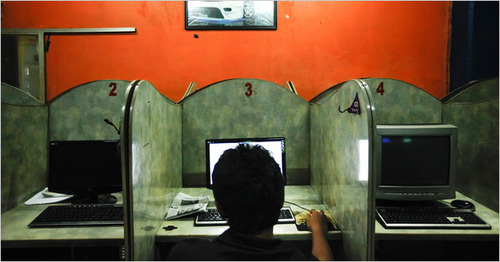INTERNATIONAL: "Debate on Internet's Limits Grows in Indonesia," by Norimitsu Onishi, New York Times, 19 April 2010.
Love this one (with no bias against Obama):
Displeased that a statue of a 10-year-old Barack Obama was installed in a park here, Indonesians took their protest not to this capital's most famous traffic circle but to Facebook. More than 56,000 online protesters later, city officials gave in to arguments that the park should be reserved to honor an Indonesian.
This example of high-tech grass-roots organizing was the direct result of the explosion of social networking in Indonesia. But the boom is prompting a fierce debate over the limits of free expression in a newly democratic Indonesia, with the government trying to regulate content on the Internet and a recently emboldened news media pushing back.
Ah, but the Internet hasn't erased all borders! So it does NOTHING for democracy and pluralism in general!
Proponents of greater freedom view social networking as a vital tool to further democratize this country's often corrupt political system. Skeptics, especially among politicians and religious leaders, worry about mob rule and the loss of traditional values.
In its latest move, the government recently proposed a bill that would require Internet service providers to filter online content but was forced to shelve it after vociferous protest online and in the mainstream media.
Thanks to relatively cheap cellphones that offer Internet access, Facebook, Twitter and local social networking media have rapidly spread from cities to villages throughout Southeast Asia, especially in Indonesia and the Philippines.
The usual, legitimate fears of mobocracy are described, but you know what? Those fears are only legitimate where governments underperform or overbear.
A prominent blogger, Enda Nasution, also said the laws could smother Indonesia's flourishing blogosphere. When Mr. Nasution, 34, began blogging early in the past decade, he said he could count the country's bloggers on two hands. Today, according to Virtual Consulting, there are more than one million Indonesian bloggers.
In Singapore, Malaysia and other countries in the region with controlled news media, blogs often tend to be sites for information that cannot be reported in the mainstream media, Mr. Nasution said. In Indonesia, because the news media are free, "bloggers also act as watchdogs or commentators," he added.
The recent online movements, he said, are a watershed in the evolving role of social media here.
"We don't know where this is going to lead us," he said, adding that supporters of regulations "are standing in the way of an online tsunami."
"You can't stop it," he said. "It's not only about technology. It's about Indonesia redefining its values."
But such talk unsettles many in what remains a culturally conservative society.
My point? Declarations of obituaries are useless. The struggle is ongoing and will always be ongoing.
But connectivity will always--in the end--win out.
